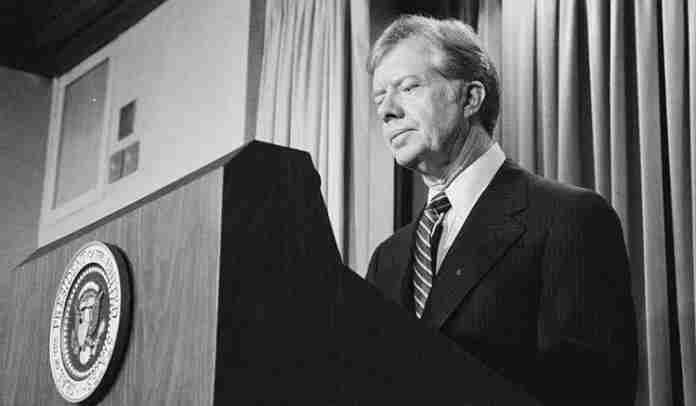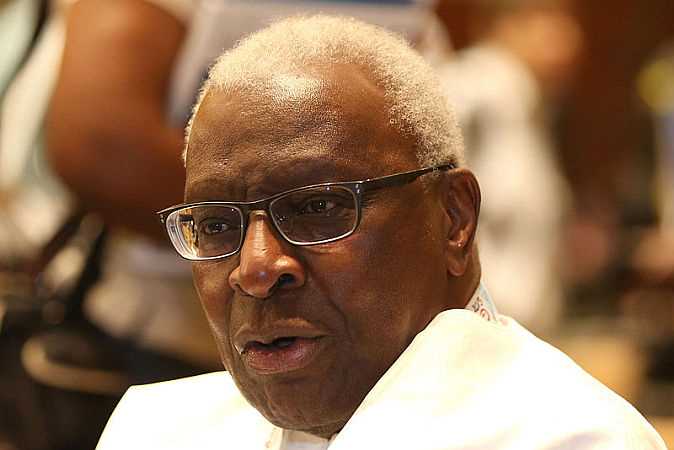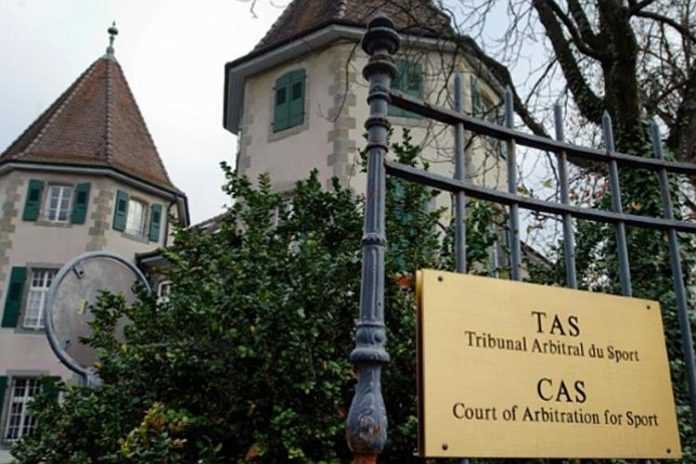For most people, 21 March is not a significant date on the annual calendar. But for more than 1,000 athletes trying to make the United States Olympic Team in 1980, it was the end of their dreams of competing in Moscow.
In response to the December 1979 invasion of Afghanistan by the Soviet Union, U.S. President Jimmy Carter announced – in front of an assembly of Olympic athletes at the White House – that since the Soviets had not left Afghanistan by his 20 February 1980 deadline, the U.S. would not participate in the 1980 Games. The key part of his address:
“But it is absolutely imperative that we and other nations who believe in freedom and who believe in human rights and who believe in peace let our voices be heard in an absolutely clear way, and not add the imprimatur of approval to the Soviet Union and its government while they have 105,000 heavily armed invading forces in the freedom-loving and innocent and deeply religious country of Afghanistan. Thousands of people’s lives have already been lost. Entire villages have been wiped out deliberately by the Soviet invading forces. And as you well know, the people in the Soviet Union don’t even know it. They do not even realize that 104 nations in the United Nations condemned the Soviet Union for their invasion and called for their immediate withdrawal from Afghanistan. The people of the Soviet Union don’t even know it.
“The Olympics are important to the Soviet Union. They have made massive investments in buildings, equipment, propaganda. As has probably already been pointed out to you, they have passed out hundreds of thousands of copies of an official Soviet document saying that the decision of the world community to hold the Olympics in Moscow is an acknowledgment of approval of the foreign policy of the Soviet Union, and proof to the world that the Soviets’ policy results in international peace.
“I can’t say at this moment what other nations will not go to the Summer Olympics in Moscow. Ours will not go. I say that not with any equivocation; the decision has been made. The American people are convinced that we should not go to the Summer Olympics. The Congress has voted overwhelmingly, almost unanimously, which is a very rare thing, that we will not go. And I can tell you that many of our major allies, particularly those democratic countries who believe in freedom, will not go.
“I understand how you feel, and I thought about it a lot as we approached this moment, when. I would have to stand here in front of fine young Americans and dedicated coaches, who have labored sometimes for more than 10 years, in every instance for years, to become among the finest athletes in the world, knowing what the Olympics mean to you, to know that you would be disappointed. It’s not a pleasant time for me.”
It was one of the low points of the Olympic Movement following World War II. The United States had, up to that time, been part of every Olympic Games – summer and winter – ever held, along with France, Great Britain and Switzerland.
Despite his declaration, Carter’s decision did not actually decide that the U.S. would not send a team to Moscow. That decision was actually in the hands of the United States Olympic Committee, which operates under a 1950 Federal charter. After considerable discussion, the USOC did decline the invitation to participate on 12 April.
The Carter Administration staged a furious campaign to get other countries to join the boycott and it received a lot of attention. A total of 66 countries did not go to the 1980 Games, although not all of these were part of the U.S.-led effort; Iran and other Islamic countries boycotted because a fellow Muslim-majority nation had been invaded.
But major powers such as Canada, Japan, Kenya, South Korea and West Germany did not go. Moreover, multiple countries had partial boycotts or demonstrations, such as seven which did not participate in the Opening Ceremony, two who sent just one person – Great Britain and Ireland – to march in the athlete parade and eight who marched in under the Olympic Flag or the flag of their National Olympic Committee instead of their country.
It was the fourth straight Games which was to become widely known for controversy and tragedy instead of athletic achievement. The 1968 Mexico City Games included a massive shooting of hundreds of demonstrators 10 days prior to the Games, then the victory-stand protest of American sprinters Tommie Smith and John Carlos, the murder of 11 members of the Israeli delegation at the 1972 Games in Munich, and the billion-dollar deficit of the 1976 Montreal Games, which was not paid off until 2006.
And the Moscow Games were impacted, rather dramatically. Only 80 nations came to the Games, the lowest number since 1956. The total of 5,259 athletes was the lowest since the 1964 Games in Tokyo.
The competition itself produced 36 world records, but an Australian study completed in 1989 concluded that “there is hardly a medal winner at the Moscow Games, certainly not a gold medal winner…who is not on one sort of drug or another: usually several kinds. The Moscow Games might well have been called the Chemists’ Games.”
But there were also events which became almost laughable due to the absence of the top athletes, who were from boycotting countries. Perhaps the most egregious example was the men’s 400 m hurdles, won by East German Volker Beck in a pedestrian 48.70, while American Edwin Moses had run a world record of 47.13 prior to the Games and ran faster than Beck’s time on 11 separate occasions during the year.
There were also “parallel” competitions in the U.S. in some sports, including the Liberty Bell Classic in Philadelphia and the U.S. Gymnastics Federation International Invitational in Hartford. Time comparisons between the winning marks in Moscow and those at the U.S. Swimming national championships were shown on the scoreboard.
The Carter Administration also got the Congress to authorize special “Congressional Gold Medals” for all of the members of the 1980 U.S. Olympic Team. These were distributed on 30 July 1980, while the Moscow Games was still ongoing. Because of the hundreds of medals awarded, they were gold-plated instead of solid gold, as for all previous Congressional Gold Medals, which had been awarded since the time of the Continental Congress. That figured.
Carter also threw the Los Angeles organizers of the 1984 Games under the bus. During his 21 March address, he included this gem, knowing full well that the next Games would be in the U.S.:
“It would suit me fine if we had a permanent Olympic site near the original Olympic Games in Olympus [sic] in Greece. We’ve advocated that. We’ve sent a delegation from the White House, along with Prime Minister Karamanlis of Greece to look at a potential site. That would please me completely. It’s going to take a while to do it. But I want to be sure that the principles of the Olympics are preserved, not wasted or destroyed or minimized.”
The boycott also caused some diplomatic chaos at the end of the Moscow Games, as the U.S. would not allow the American flag to be raised during the Closing Ceremony as the next host country. Instead, the City of Los Angeles flag was raised, and there was no hand-off of the International Olympic Committee’s Antwerp flag from the Mayor of Moscow to the Mayor of Los Angeles, because L.A. Mayor Tom Bradley wasn’t there.
The inevitable retaliatory boycott from the Soviets and their allies did indeed take place in 1984, but only 15 countries stayed away in league with the USSR, and a then-record 140 nations took part in the 1984 Games, part of its revolutionary success.
Carter’s boycott is now almost universally disdained as a bad idea, which did nothing to allay the suffering in Afghanistan. The Soviet adventure there only ended in 1989 after a long series of setbacks and a heavy program of Western support for local fighters.
But for those athletes whose one chance at the Olympic Games was in 1980, it was an opportunity permanently lost. The line, “the only losers of a boycott are the athletes” was born out of this error in U.S. foreign policy. And it’s as true today as it was then.
Rich Perelman
Editor


























